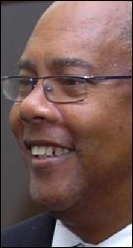NHF could collapse - Cash problems loom, says CEO
Published: Sunday | September 6, 2009


File photos
LEFT: Lawson
RIGHT: A security guard at the Spanish Town Hospital, St Catherine, rushes with a little boy to the Emergency Ward of the hospital after his mother complained that he was vomiting. The National Health Fund provides support to hospitals to better enable them to respond to emergencies such as this one.
Athaliah Reynolds, Staff Reporter
THE MANAGEMENT of the National Health Fund (NHF) is issuing warning signs about the sustainability of the programme.
Hugh Lawson, chief executive officer of the NHF, has cautioned that without additional funding the programme could collapse within the next few years.
The NHF currently provides support to the national health-care system, by subsidising drugs for more than 400,000 Jamaicans affected by chronic illnesses. It also provides assistance to private- and public-sector organisations for health projects.
According to Lawson, while the NHF is now financially sound, based on projections it could face cash problems by 2013 if funding is not increased.
"We need more money, we have been doing our job and I think most Jamaicans are reasonably satisfied with what we have been doing," Lawson told The Sunday Gleaner.
"Having provided the results, we are now saying you need to give us the capacity to continue the work. Why we mention 2013 is that we expect new members to come on stream, in times like these we expect more people to utilise the card system, so as good managers we are being proactive and preparing ourselves to continue the job," Lawson added.
The NHF is currently funded by the special consumption tax that is charged on tobacco products, alcohol and petrol, as well as money collected through the National Insurance Scheme.
Since its establishment in 2003, the NHF has collected more than $15 billion, while spending close to $3.2 billion on an annual basis.
Projections
Last year, the organisation approved more than $286 million for institutional benefit projects, $274 million for 15 new projects and close to $8 million being additional funding for six projects previously approved.
The NHF also spent $110 million for administrative initiatives and approved a number of projects to the tune of more than $824 million.
The Government has promised to pump additional cash into the coffers of the health-care organisation.
In the last Budget presentation, Finance Minister Audley Shaw promised that additional funding would be provided to the NHF through the recently imposed gas tax, as well as the new threshold for the NIS.
Lawson also pointed out that the NHF has also seen an increase in the money it receives from the tax on tobacco, since the appointment of the new director of customs, Danville Walker.
However, projections for the next few years are that new membership to the NHF will continue to climb, especially in light of the current economic conditions.
At the end of March 2009, enrolment in the programme was by about 16 per cent over the previous year. The programme processes close to 4,500 applications per month, with the utilisation rate (though now only 35 per cent) expected to increase.
"If the trend continues, this will create an additional demand on the funds that are available," Lawson said.
Also, the NHF continues to receive requests from the Ministry of Health to expand its programme by adding new projects and conditions.
Sustainable
"Of course, each condition brings a whole slew of additional drugs," he informed. "We only carry 15 illnesses now and we are going to be asked to carry more.
"At this point in time, we are actually looking at two other benefits to bring on to the programme, but we have to ensure that they are sustainable."
Lawson was supported by Aubrey Blair, vice-president of finance and corporate affairs at the NHF, who echoed the claim that the organisation is financially sound, while adding that it was right on target with its finances and schemes.
However, Blair said if the NHF was to find itself in financial difficulty the first thing it would cut would be the number of projects that it has approved.
But Lawson said the NHF is hoping that it will not have to go down that road any time in the near future.
athalia.reynolds@gleanerjm.com








